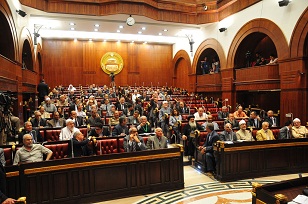President Abdel Fattah Al-Sisi’s first year has witnessed several alterations in the economic landscape, with the government focusing on attracting foreign investments and inaugurating mega projects sponsored by the state. Al-Sisi has issued several Presidential Decrees, with a focus on cigarette taxes, approving financial loans and allocating lands for industrial projects.
On the other hand, some controversial decisions are still trapped in the cabinet, awaiting final approval to be sent to the presidency for ratification.

(AFP FILE PHOTO / HO / EGYPTIAN PRESIDENCY)
List of issued presidential decrees:
July 2014
- Al-Sisi issues decree for a 50% increase on cigarette taxes, a 200% increase on beer and 150% on other alcoholic beverages.
- Decree issued to ratify the maximum wage for public employees to EGP 42,000, 35 times the minimum wage, which was set at EGP 1,200.
August
- Al-Sisi issued Presidential Decree 117/2014 amending the 196/2008 Property Tax Law. The amendment modifies the tax-exempt tranche to include those owning EGP 2m in a single residential unit, while the original law had exempted only those owning an EGP 2m in residential properties in total.
September
- On 1 September, Al-Sisi approved the Suez Canal investment certificate law, to fund the new Suez Canal project. The investment certificates were provided by the National Bank of Egypt (NBE), Banque Misr, Banque du Caire, and the Suez Canal Bank.
November
- Al-Sisi issued a presidential decree approving a financial loan agreement between the Egyptian government, the European Investment Bank (EIB) and the European Union (EU). The EIB will loan Egypt €77m, while the EU will grant €15m, for a sanitation project in Kafr El-Sheikh governorate in northern Egypt.
- Al-Sisi issued decree 405/2014 to organise and ensure the support of the Mortgage Finance Fund specialising in controlling markets and financial non-bank instruments. The articles of the decree organise the rules governing the work of the fund and its objective and terms of reference.
December
- Al-Sisi issued a presidential decree Sunday appointing a board of trustees for the ‘Long Live Egypt’ Fund. Members of the new board include former Grand Mufti Ali Gomaa, CBC channel owner Mohamed Al-Amin, business tycoon Naguib Sawiris, head of the financial affairs department in the armed forces General Mohamed Amin Ibrahim Nasr, Reham Abu Ismael, and businessman Basil El-Baz.
January 2015
- Al-Sisi issued a decree to allocate approximately 5,000 acres from the state-owned lands in Aswan to establish a phosphate industrial zone, with estimated investments totalling EGP 3.3bn.
February
- Al-Sisi issued a decree for a 50% increase on cigarette taxes, in addition to EGP 2.25 increase for cigarette packets priced under EGP 10, an increase of EGP 3.25 on packets between EGP 10-EGP 16 and an EGP 4.25 increase on packets whose price is more than EGP 16.
- In line with the government’s intention to increase projects in South Sinai, Al-Sisi issued a decree to allocate approximately 1,000 sqkm from the state-owned lands for the benefit of South Sinai governorate to establish an industrial zone.
- Al-Sisi also approved the allocation of approximately 473,000 acres of land in Ras Sedr to establish an airport there.
March
- Al-Sisi issued a decree to establish the Specialist Council for Economic Development.
- A presidential decree issued on 12 March aims to provide those involved in the illegal seizure of public funds a method for reconciliation with the state. The decree was issued to amend three articles of the Criminal Code’s procedures.
April
- Al-Sisi approved a $500m loan agreement to deliver natural gas to homes. The loan is between the Egyptian government and the International Bank for Reconstruction and Development (IBRD), a World Bank member.
- Al-Sisi approved a rent agreement between Egypt and the Islamic Development Bank to rent equipment worth of $222m, to be used in the West Cairo power plant.
May
- Al-Sisi issued a decree to approve the agreement, signed during the Sharm El-Sheikh Economic Summit, between the Ministry of International Cooperation and the International Islamic Trade Finance Corporation (ITFC). This will provide the finance to import basic commodities to Egypt, such as butane gas, diesel, petroleum products, wheat and food commodities.

(Photo courtesy of Ministry of Finance )
Decisions awaiting final cabinet approval:
The government considered replacing the existing General Sales Tax with the value-added tax (VAT). This form of consumption tax is applied in the EU, and is placed on a product whenever value is added to a stage of production and at a final sale.
A coalition of non-governmental organisations (NGOs) voiced their opposition the application of VAT, saying that despite the fact that VAT is widely-applied in over 130 countries, it is one of the taxes that are “prejudiced” against the rights of the citizens. They argued that it is applied on all products and services, with the consumer eventually bearing the effect of the tax.
Another controversial economic tax was the tax on capital gains, which took effect last July, but then halted for two years following a cabinet decision, aiming to revive investment in the Egyptian stock market.
Moreover, the government decided in June 2014 to create a temporary additional yearly tax of 5% for three years, covering those whose net income exceeds EGP 1m for the income of natural persons, or the profit of “legal persons,” referring to companies, organisations and institutions. This tax has yet to come into effect after facing obstacles – the presidency has also not yet approved the law.
In efforts to lure investments in the Sharm El-Sheikh Economic Summit, the government approved the draft of the Unified Investment Law, which offers several incentives regarding energy and lands allocation, however, the law is yet to be approved.




